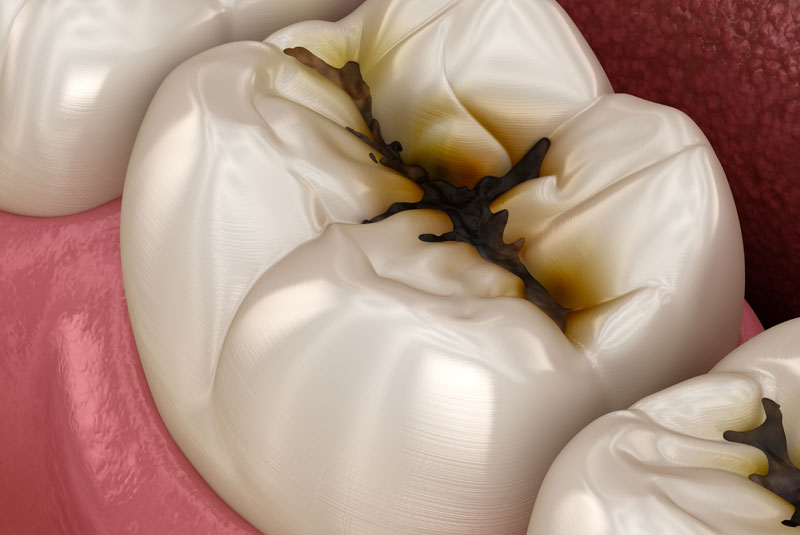


If you’re suffering from a severely damaged or infected tooth, you may not have to lose it. With modern root canal treatment, we can relieve your pain and save your smile. During the procedure, Drs. Tharp, Klaus & Kelly in Jackson, MS will gently remove infected pulp from inside your tooth roots and seal the area to prevent further infection. While some residual soreness may follow, a successful root canal means saying goodbye to pain and preserving your natural tooth for many more healthy years.
If you’re experiencing signs of a severely damaged or infected tooth that may require a root canal, call Drs. Tharp, Klaus & Kelly in Jackson, MS at 601-939-4100 to schedule a consultation and find relief.
A root canal is a procedure to repair and save a tooth that has become badly damaged or infected. During a root canal, your dentist will remove the infected or dead pulp from inside the tooth roots and seal the area to prevent further damage. With proper aftercare, a root canal can help restore functionality and keep natural teeth for many more years.
There are several common reasons why someone may require a root canal procedure:
Extensive decay that has reached deep inside the tooth, infecting or killing the inner pulp tissue, often requires a root canal. Our Dentists will recommend a root canal if the decay is too deep to treat with a simple dental filling.
Cracks or fractures that extend below the gumline into the roots can allow bacteria to infect the pulp. Root canals are frequently needed for cracked teeth to clean out the infected tooth pulp and save the remaining tooth structure.
Multiple fillings, prior root canals, or other restorative work on a tooth can eventually cause the inner pulp to become irritated and inflamed. A root canal may be required to treat the subsequent infection.
A severe blow or injury that fractures roots or dislocates the tooth may damage the pulp and require root canal therapy to prevent further infection.
The steps involved in a root canal procedure include:
Your dentist will administer a local anesthetic to fully numb the area around the affected tooth. You shouldn’t feel any pain during the procedure.
A small hole is made through the top of the tooth to reach the pulp chamber and root canals. Your dentist will use specialized dental instruments to gently remove the pulp.
All of the infected or dead pulp is carefully cleaned out of the inner root canals. This is one of the most important steps to root canal treatments eliminate bacteria and prevent further infection.
Small specialized instruments will be used to thoroughly shape and clean the entire length of the root canals. This prepares the canals to be sealed.
Once cleaned, shaped, and disinfected, the empty root canals are filled and sealed with an inert rubbery material called gutta-percha. This prevents recontamination of the roots.
After the root canals are sealed, the tooth will be restored with a filling or dental crown to protect it and improve its appearance. The restored tooth can often last a lifetime with proper care.
Following a root canal, patients should take measures to allow proper healing:
In a small percentage of cases, root canals can fail over time due to re-infection or complications. This may require a repeat root canal or extraction if the tooth cannot be saved. With good oral hygiene and follow-up care, a properly done root canal has a very high long-term success rate.
It is normal to experience some mild soreness or tenderness for a few days after having a root canal. Over-the-counter pain medication can provide relief. However, you should not feel intense pain – let your dentist know if symptoms persist.
Often a crown is recommended after a root canal to fully protect and restore the tooth. The crown covers and seals the tooth from fractures or re-infection. Alternatively, a temporary filling may be sufficient depending on the location and amount of remaining tooth structure.
Most patients can return to their normal routine immediately after the root canal is completed. Recovery from a dental procedure typically takes one to two days, during which the tooth may be sensitive. After two to three weeks, healing is usually sufficient to resume normal chewing on the tooth.
Tooth pain doesn’t have to control your life. With today’s advanced dental techniques, you can say goodbye to the ache and keep your natural smile. If you’re tempted to have an infected tooth pulled because you fear root canal pain, don’t despair. The skilled dentists at Drs. Tharp, Klaus & Kelly in Jackson, MS prioritize patient comfort every step of the way.
With modern anesthesia and gentle care, our dentists can transform your frown into a smile. Take back your peace of mind and function – call 601-939-4100 today to schedule a root canal consultation. Discover how a little treatment can go a long way to restoring your confidence and quality of life. We serve new and returning patients from Jackson, and surrounding areas such as Florence, and Canton, MS.
I understand the information disclosed in this form may be subject to re-disclosure and may no longer be protected by HIPAA privacy regulations and the HITECH Act.